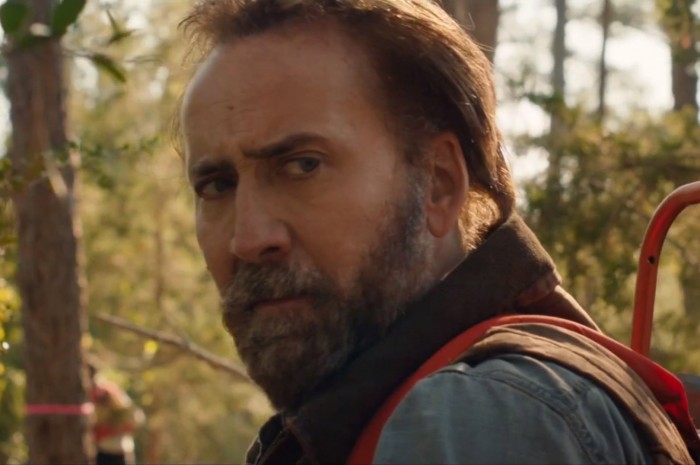
Director David Gordon Green’s career is all over the place, although judging from his Q&A on the Wisconsin Film Festival’s opening night, he’d be the first one to tell you. Green’s newest, Joe, is a far cry from the tongue-in-cheek lunacy of Pineapple Express and its hyperviolence sets it apart from slower, arthouse pictures like Prince Avalanche, which opened the Cinematheque’s calendar last fall. Joe has moments of tranquility but it operates between extremes, much to the benefit of its lead, Nicolas Cage, whose solid performance doesn’t beef up a smaller picture. It takes it over.
Cage stars as the title character, a grizzled ex-con looking to put his past behind him by leading a rag-tag crew of “tree poisoners” through the forests of Austin. The addition of a determined teenager (Mud‘s Tye Sheridan) finds Joe struggling to be a role model for the directionless youth. Broadly, Joe works to straighten the path of Sheridan’s Gary Jones, but the young actor’s onscreen chemistry with Cage is indicative of both Cage’s magnetism and a film that bows to the presence of its lead in every way. Events seem determined by where Cage’s character happens to be, especially a sub-plot where Joe feuds with a scarfaced dirtbag (played with mirth by Peter Sarsgaard doppelganger Ronnie Gene Blevins). One minute, Blevins’ character is stalking Joe with a rifle and a chip on his shoulder before disappearing for scenes on end while Joe fights off a young woman’s advances or makes his weekly stop to the town whorehouse. (If the prostitutes’ fawning over Cage’s presence weren’t enough, even their guard dog won’t shut up when he comes knocking.)
In fairness to everyone’s obsessions, Joe’s intrigue comes from a mysterious background and solid performance by Cage. He wears a bushy beard like a mask, trying and failing to hide behind it as it enlarges his cheek bones and jowls. Cage seems bigger and bolder and not merely by virtue of the actor baring his intricately designed tattoos. Cage’s performance seems to be begging us to forget those questions as he seems to be barely holding it together. In Cage’s hands, a night out at a Texas saloon seems less like a comfort and more a means of quelling a quick-trigger temper, and Cage includes several subdued but pointed outbursts with a phlegmy smoker’s cough that punctuates orders to his work crew.
Compared to Cage’s recent work, small acting choices feel infinitesimal; compared to Joe‘s cast of unknowns, they loom over everything. Drawing from Austin’s townsfolk, Green tries matching his story’s insular scope with a genuine slice of roughneck Texas life. Raw, feisty performances from Brian Mays and especially Gary Poulter, as Sheridan’s drunk father, reveal the director’s skill at casting locals and while their subtlety and naturalism flow with Green’s off-the-cuff improvisation, they only exaggerate Cage’s bigger moments by comparison. Cage’s bulging eyes or a slightly exaggerated wince of pain become melodramatic. With the magnitude of Cage’s presence among a sea of relative nobodies, that subtlety might as well be a soapbox, indirectly propping up Cage as a grenade with a loose pin. Is it any wonder so many in the audience asked Green about his experience with the actor?
The exaggeration in this headline isn’t lost on me, especially in a time when internet hyperbole comes cheap. As someone who’s well-versed in Cage-isms however, I couldn’t help but bring past impressions from The Sorcerer’s Apprentice and Ghost Rider: Spirit of Vengeance into Joe, the first patently serious dramatic effort from the actor in some time. I suspect Green’s tendency to drift away from script and improvise fit well with a performer known for bringing unique elements to each role, and the same startling texture and rawness in Prince Avalanche returns here. Joe is less successful when its impulses feel divided by narrative and atmosphere, but in the end, we’re all servants to the Cage anyway.
